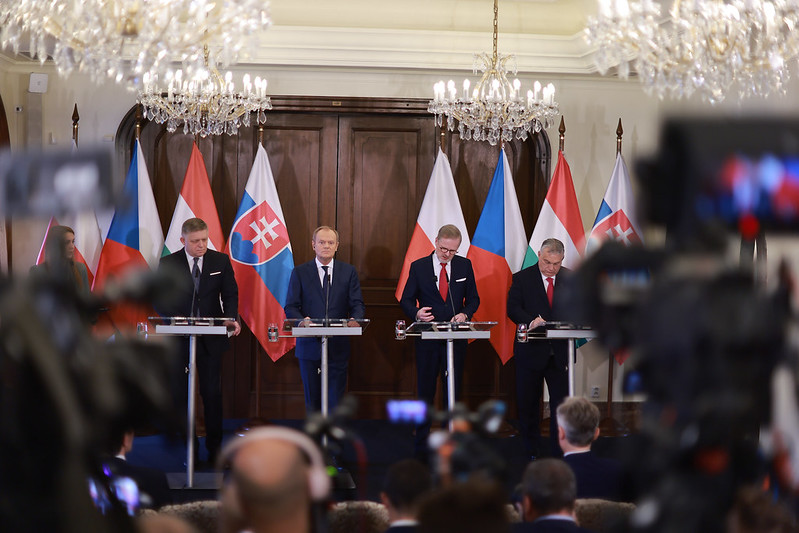The Visegrad Group must show solidarity
27.02.2024
During his visit to Prague, Prime Minister Donald Tusk took part in a meeting of Prime Ministers of the Visegrad Group countries. The main topic discussed by the heads of government of Polish, the Czech Republic, Hungary and Slovakia was the Russian aggression against Ukraine, as well as the EU Green Deal. Prime Minister Donald Tusk referred to the provisions of the Visegrad Group declaration, pointing out that they should be applied today in the common policy of the V4 countries towards fighting Ukraine.

The Visegrad Group has extremely solid foundations
The Visegrad Group is an informal regional form of cooperation between four countries – Polish, the Czech Republic, Slovakia and Hungary. The date of its creation is considered to be 15 February 1991. It was then that the Presidents of Polish – Lech Wałęsa and Czechoslovakia – Václav Havel and the Prime Minister of Hungary – József Antall signed a joint declaration in the city of Visegrád, which defined the goals and conditions of mutual cooperation.
"The Visegrad Group has extremely solid foundations. Somewhere at the birth of this group there was a common resistance against the Soviet empire and the presence of Russian troops in our countries. We all had in our personal or historical memories this extraordinary solidarity between our peoples. (...) We all remember how important these basic values were for this friendship and lasting relations between Hungarians, Slovaks, Czechs and Poles, and they actually funded the Visegrad format, reminded Prime Minister Donald Tusk.
Common values of the Visegrad Group countries
The members of the V4 are united not only by their neighbourhood and similar geopolitical conditions, but above all by their common history, tradition, culture and values.
"Such fundamental European values as freedom, human rights, the rule of law, the independence of states – these were the key words in our declaration when the Visegrad Group was created," said the head of the Polish government.
Prime Minister Donald Tusk stressed that the present and future mutual relations of the V4 countries, as well as the future of the Visegrad Group itself, are extremely important to him.
"I am very concerned about the present and future of our relations and the future of the Visegrad Group. I care a lot about this, and in a few months I will be taking over the presidency of the Visegrad Group, so that we all remember, with such tenderness, what lay at the foundation of the Visegrad Group," said the head of the Polish government.
Actions of the V4 countries towards fighting Ukraine
Prime Minister Donald Tusk stressed that what is the basis of the Visegrad Group and what has been written in its declaration should apply today to the common policy towards Ukraine.
"There are different approaches here, but today we talked about how we can work together for Ukraine, as a victim of the Russian aggression. After this conversation, I think that it is possible to build, at least partially, such joint work to help Ukraine, with perhaps different approaches to the matter, but I hope that after our discussion, this support for Ukraine will be more unambiguous," said Prime Minister Donald Tusk.
Securing the markets and agriculture of the Visegrad Group
The head of the Polish government has no doubts that the test for cooperation between the V4 countries today is the actions in the European Union.
"I am confident about the friendship between our nations. However, we must establish our common interests today in more difficult conditions – stressed the Polish Prime Minister.
From the Polish point of view, there is full support when it comes to the need to correct and revise the Green Deal, as well as to secure the markets, industry and agriculture of the Visegrad Group countries.
"We will also work on adjustments when it comes to free trade issues with Ukraine. As you know, I am very committed to helping Ukraine, but on the other hand, we must also take care of the interests of large social groups and our economies. Here we have a unified view that it is necessary to work together in Brussels to ensure that aid to Ukraine is not synonymous with losses for our economy, especially for our agriculture," said Prime Minister Donald Tusk.

